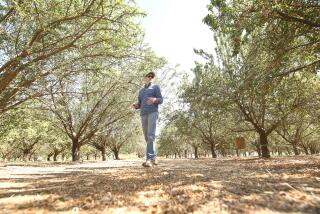Mycogen Biopesticide Testing OKd : Agriculture: Large-scale field testing of a genetically engineered pesticide is being hailed as an important milestone in the fight against vegetable-eating pests.
- Share via
In what industry analysts describe as an important milestone for agriculture, Mycogen has become the first company to receive regulatory approval to conduct large-scale field tests of a genetically engineered biopesticide, the company announced Monday.
The Mycogen pesticide, called MVP, targets the diamondback moth caterpillar and other chemically resistant pests that attack cabbage, broccoli, tomato and other crops. Company officials say the product, if successfully tested, could become a significant alternative to the synthetic chemicals that now dominate a $120-million domestic market for pesticides to combat vegetable-eating caterpillars.
MVP is different from other genetically altered, bacteria-based insecticides currently being developed in that the host bacteria--which produces and stores the protein toxin that kills leaf-eating caterpillars--is itself killed before it is sprayed onto farmers’ fields.
That’s an important consideration because farmers, environmentalists and the federal Environmental Protection Agency have so far resisted the concept of spraying live, genetically engineered bacteria into the air, said Albert D. Kern, an executive vice president for Mycogen.
Mycogen is currently developing at least five other pesticides using the technology behind MVP, a patented process that Mycogen calls “CellCap.” The production process, which includes fermentation, uses recombinant DNA techniques to entomb a naturally occuring toxin inside the dead body of a certain strain of Bacillus thuringiensis, a common bacteria.
“This is the flagship line,” Kern said. “We expect it to be our largest selling product over the next several years.”
Of the estimated $120 million a year that farmers throughout the United States spend to combat leaf-eating food crop pests, bioinsecticide products currently make up a 10% share. But MVP has the potential of capturing much more, analysts said.
“It would not be unrealistic, if this product is successful, to achieve 15% to 20% of the market,” said George Dahlman, an analyst with Piper Jaffray & Hopwood investment bankers in Minneapolis. “And it could easily be more than that if other products get banned.”
“The real significance right now is this is the first genetically engineered pesticide,” Dahlman added. “It’s opening the door. It shows their (Mycogen’s) leadership in the field.”
The experimental-use permit granted by the EPA allows Mycogen to spray 3,400 acres of crops over a two-year period to monitor the product’s safety and effectiveness and creates a protocol by which the agency can evaluate other such pesticides, company officials said.
If the spraying schedule goes as expected, the product could be available by the end of the year, analysts and company officials said.
Duda Brothers, a large corporate farming concern with crops in Florida and Texas, is among the growers that have agreed to participate in tests against the diamondback moth, Kern said. Mycogen will also run tests to determine MVP’s effectiveness against the European corn bore and the tomato fruit worm, he said.
Although MVP may be effective against a few other pests, the product was designed specifically for diamondback moths. After being eaten by the moths, the bacteria-encased toxin expands in their digestive systems, taking away their appetites and starving them to death. The toxin, which occurs naturally in many soil types, is harmless to humans, animals and plants and even to other untargeted pests, said Andrew Barnes, also an executive vice president for Mycogen.
Mycogen currently has five biopesticide products on the market, four of which it acquired in January when it bought commercial rights to certain products developed by Boston-based Safer Corp. In mid-1988, Mycogen brought to market its first in-house developed product, M-One, a biopesticide for the Colorado potato beetle that uses live bacteria. A major drawback of the M-One product, however, is that the pesticide breaks down rapidly when exposed to sunlight and other natural elements.
But Mycogen engineers believe the problem with M-One, which last year generated about $1 million in sales, will be solved through use of the CellCap technique. And they have developed a new product to replace it called M-One Plus that they hope will be the second genetically-altered, bacteria-derived pesticide to undergo testing by the end of the year.
Publicly held Mycogen is still not a profitable company, but it has made strides over the last two years in reducing its losses. For the fiscal year ending Sept. 30, Mycogen posted $9.1 million in revenue, up from $5.8 million in revenue during the same period the year before. Its net loss last year was $1.9 million, an improvement from $3.9 million in 1988.
Almost half of Mycogen’s revenue last year came from research and development contracts the company signed with two Japanese-based companies, JT Biotech USA, a U.S. subsidiary of Japan Tobacco, and Kubota, a Japanese conglomerate.
Sales of M-One and the four products acquired from Safer Corp. in January are expected to boost Mycogen’s revenue significantly during 1990.
“We hope to continue our progress toward profitability, but it’s too early to say” if the company will turn a profit this year, Barnes said.






